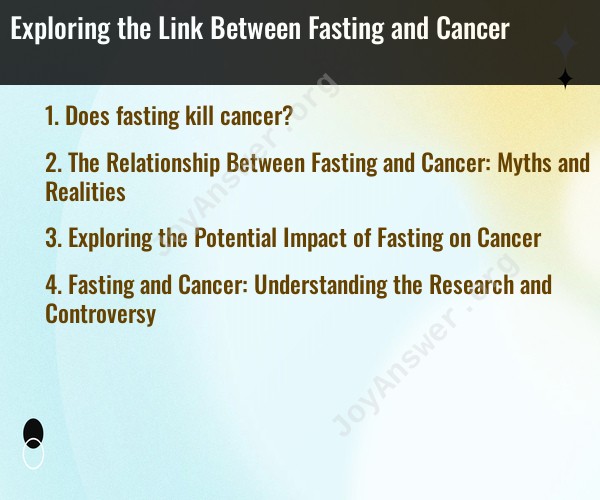Does fasting kill cancer?
The relationship between fasting and cancer is a complex and ongoing area of research. While there is some evidence to suggest that fasting may have potential benefits in cancer treatment and prevention, it's important to clarify that fasting alone is not a cure for cancer, nor does it "kill" cancer cells directly.
Here are some key points to understand about the link between fasting and cancer:
Fasting and Cancer Treatment: Some studies in animal models and limited clinical trials have suggested that fasting, or more specifically, fasting-mimicking diets (FMDs), may enhance the effectiveness of certain cancer treatments, such as chemotherapy and radiation therapy. Fasting or FMDs might make cancer cells more vulnerable to these treatments while potentially protecting normal cells. However, this research is still in its early stages, and more studies are needed to confirm the benefits and safety in humans.
Autophagy: Fasting may stimulate a process called autophagy, which is the body's way of cleaning out damaged cells and cellular components. This process can help remove defective cells, potentially reducing the risk of cancer development. However, the relationship between autophagy and cancer is complex, as autophagy can both promote and inhibit cancer progression depending on the context.
Prevention: Some research has suggested that intermittent fasting or calorie restriction may have a role in cancer prevention. It might help with weight management and reduce risk factors associated with cancer, such as obesity and insulin resistance. However, more research is needed to establish a clear link.
Individual Variability: It's essential to recognize that fasting may not be suitable or safe for all individuals, especially those with certain medical conditions, and the effects can vary from person to person. It's crucial to consult with a healthcare professional before considering fasting, especially for cancer patients or those at risk.
In summary, while there is ongoing research exploring the potential benefits of fasting in cancer treatment and prevention, it is not a standalone cancer treatment. Fasting should be considered as a part of a comprehensive approach to cancer care, under the guidance of medical professionals. Cancer treatment should be based on established therapies, and any use of fasting as an adjunct should be discussed with a healthcare provider.
The Relationship Between Fasting and Cancer: Myths and Realities
Fasting, the practice of abstaining from food or drink for a certain period, has been associated with various health benefits, including weight loss, improved blood sugar control, and reduced inflammation. However, claims surrounding its potential impact on cancer prevention and treatment have sparked both interest and controversy. It's important to distinguish between myths and realities when exploring the relationship between fasting and cancer.
Myth 1: Fasting can cure cancer.
This is a significant overstatement. While fasting may have some potential benefits for cancer patients, it is not a cure. Cancer treatment remains complex and requires a multidisciplinary approach involving surgery, chemotherapy, radiation therapy, and targeted therapies. Fasting may play a supportive role in this context, but it should not be considered a substitute for conventional treatment.
Myth 2: Fasting starves cancer cells to death.
This is a simplistic view of cancer metabolism. Cancer cells are adept at adapting to various metabolic conditions, including low-nutrient environments. While fasting may temporarily reduce glucose levels in the blood, cancer cells can switch to other energy sources, such as glutamine, to maintain their growth.
Reality 1: Fasting may enhance the effectiveness of chemotherapy.
Studies suggest that fasting may make cancer cells more vulnerable to chemotherapy by increasing their reliance on oxidative phosphorylation, a metabolic process that can be targeted by certain chemotherapy drugs. Additionally, fasting may protect healthy cells from the toxic effects of chemotherapy, potentially reducing side effects.
Reality 2: Fasting may boost the immune system.
Fasting has been shown to induce autophagy, a cellular process that removes damaged or dysfunctional components. This process may also lead to the regeneration of immune cells, potentially enhancing the body's ability to fight cancer.
Exploring the Potential Impact of Fasting on Cancer
Research into the potential impact of fasting on cancer is still in its early stages. While some studies suggest promising benefits, more rigorous clinical trials are needed to confirm these findings and determine the optimal fasting protocols for cancer patients.
Potential benefits of fasting for cancer patients:
Enhanced chemotherapy efficacy
Reduced chemotherapy side effects
Boosted immune function
Improved overall well-being
Potential drawbacks of fasting for cancer patients:
Nutritional deficiencies
Muscle loss
Fatigue
Interactions with medications
Fasting and Cancer: Understanding the Research and Controversy
The research on fasting and cancer is complex and ongoing. Some studies have shown positive results, while others have found no significant benefits or even potential harm. The controversy arises from the different fasting protocols used, the varying types of cancer studied, and the complexities of cancer metabolism.
Key points to consider:
Fasting should not be considered a substitute for conventional cancer treatment.
Patients should consult with their oncologists before initiating any fasting regimen.
Individualized fasting protocols may be necessary depending on the patient's cancer type, treatment plan, and overall health status.
More research is needed to establish clear guidelines for fasting in cancer patients.










